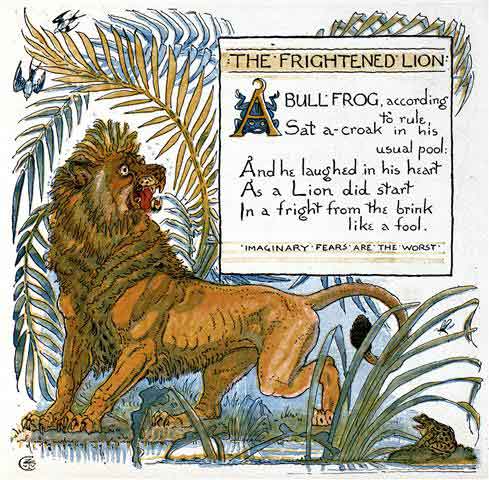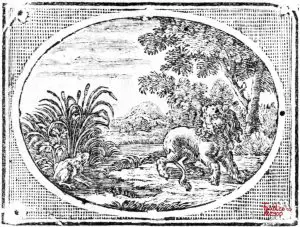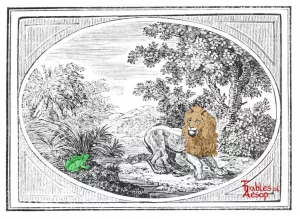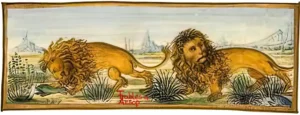Imaginary fears are the worst. A frightened lion gets scared by a bullfrog while crossing a swamp.
Imaginary fears are the worst.

JBR Collection (The Lion and The Frog)
The Lion hearing an odd kind of a hollow voice, and seeing nobody, started up. He listened again; the voice continued, and he shook with fear. At last seeing a Frog crawl out of the lake, and finding that the noise proceeded from that little creature, he spurned it to pieces with his feet.

Samuel Croxall (The Lion and the Frog)
THE Lion, hearing an odd kind of a hollow voice, and seeing nobody, started up; he listened again, and perceiving the voice to continue, even trembled and quaked for fear. At last, seeing a Frog crawl out of the lake, and finding that the noise he had heard, was nothing but the croaking of that little creature, he went up to it, and partly out of anger, partly contempt, spurned it to pieces with his feet.
THE APPLICATION
This fable is a pretty image of the vain fears and empty terrors with which our weak misguided nature is so apt to be alarmed and distracted. If we hear but ever so little noise, which we are not able to account for immediately, nay, often before we give ourselves time to consider about it, we are struck with fear, and labour under a most unmanly, unreasonable trepidation; more especially if the alarm happens when we are alone, and in the dark. These notions are ingrafted in our minds very early; we suck them in with our nurse’s milk; and therefore it is the more difficult, when we are grown up, and ashamed of them, to root them out of our nature. But, in order to it, it is well worth our while to observe, that the most learned, the most ingenious, and candid writers, in all ages, have ridiculed and exploded the belief of such phantoms, as the weaker part of mankind are apt to be terrified with; intimating, that goblins, spectres, apparitions, fairies, ghosts, &c. were invented by knaves to frighten the fools with. Fear is a natural passion; and its use is, to put us upon our guard against danger, bv alarming the spirits. Now all passions should be kept in a state of subjection; for though they are good, useful servants, yet, if once they get the better, they prove the most domineering tyrants imaginable; nor do any of them treat us in so slavish and abject a manner, as that of fear. It unnerves and enfeebles our limbs, precipitates or fetters our understanding; and, at the same time that it represents a danger near at hand, disarms, and makes us incapable of defending ourselves against it. This is the case, even in respect of real dangers, as fire, thieves, or violent enemies; and, even in this case, a man of either sense or honour would be ashamed to be detected in such a weakness. But when the cause of our alarm is groundless, and subsists no where but in our own childish imaginations, we should not only take care how we expose ourselves upon that acqount, but resolve to man our understanding with reason and fortitude enough to maintain it against the attacks of every little imaginary phantom. Kven those who have thoroughly reasoned the point, may yet retain something of the old woman in their minds, which having taken root too deep to be entirely plucked out, may sometimes surprise them in an ungarded moment, and make them start like the Lion in the fable: but then they presently recollect themselves, and, as he did, treat the cause of their delusion with the utmost contempt.

Thomas Bewick (The Lion and The Frog)
The Lion hearing an odd kind of hollow voice, and seeing nobody, started up: he listened again, and hearing the noise repeated, he trembled and quaked for fear. At last, seeing a Frog crawl out of the lake, and finding that the noise he had heard was nothing but the croaking of that little creature, he went up to it with great anger; but checking himself, turned away from it, ashamed of his own timidity.
APPLICATION.
The early prejudices of a wrong education can only be eradicated from the strongest minds. The weak retain them through life. This Fable is a pretty image of the vain fears and empty terrors, with which our weak misguided nature is so apt to be alarmed and disturbed. If we hear but ever so little noise which we are not able to account for, immediately, nay, often before we give ourselves time to consider about it, we are struck with fear, and labour under a most unmanly and unreasonable trepidation; more especially if the alarm happens when we are alone, and in the dark. These fears are ingrafted into our minds very early, and therefore it is the more difficult, even when we are grown up, and ashamed of them, to root them out of our nature. They are chiefly the offspring of the nursery, and originate in the many terrific tales, and lying stories, of those who have the management there; and though every pains be afterwards taken to free the mind from the impression of such groundless fears, the weaker part of mankind are still apt to be terrified at the empty phantoms of ghosts, spectres, apparitions, and hobgoblins. But whatever effect such phantasies may have upon the guilty mind, innocence has nothing to dread from supernatural causes. Fear is however a natural passion, and its use is to put us upon our guard against danger, by alarming the spirits: but it, like all our other passions, should be kept in a state of subjection: for though they are all good and useful servants, yet if once they get the better of our reason, they prove the most domineering tyrants imaginable; nor do any of them treat us in so abject and slavish a manner as fear: it unnerves and enfeebles our limbs, while it fetters our understandings; and at the same time that it represents a danger near at hand, disarms and makes us incapable of defending ourselves from it. But we ought to call forth a sense of honour and shame, to correct such weaknesses; and for this purpose it will be useful to remember the Fable of the Lion and the Frog.

Crane Poetry Visual

A Bull Frog, according to rule,
Sat a-croak in his usual pool:
And he laughed in his heart
As a Lion did start
In fright from the brink like a fool.
Imaginary fears are the worst.

Gherardo Image from 1480

Rana et Leo
Ranam magna vi crocitantem cum leo olim audisset, ad eam vocem protinus sese convertit, magnum aliquod animal esse arbitratus. Paulisper itaque cum substitisset, ubi illam ex palude prodeuntem adspexit, accedens illico proculcavit, haec intra se aiens, “Neminem, re nondum perspecta, vox audita conturbet; nec quispiam, antequam viderit, ab ullo deterreatur.”
Perry #141


